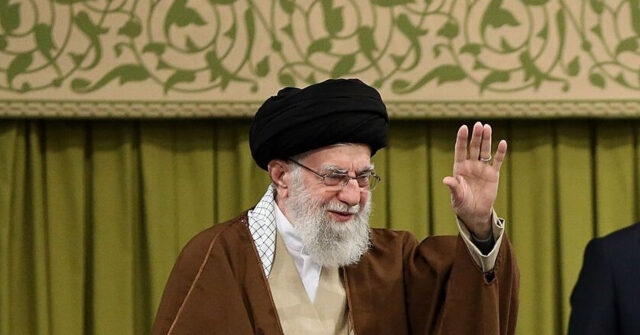Iranian “Supreme Leader” Ayatollah Ali Khamenei told officials in his country on Tuesday that a first round of talks between two top American and Iranian diplomats this weekend was “implemented well,” a sharp turn away from his refusal to engage America in any way as recently as two months ago.
Khamenei had described any exchange with the United States as “unintelligent and dishonorable” in February, pointing to the failing of the 2015 Joint Comprehensive Plan of Action (JCPOA), or Iran nuclear deal, which collapsed due to Iran’s repeated violations of the agreement. The head of the International Atomic Energy Agency (IAEA), Rafael Grossi, lamented in June that that JCPOA “exists only on paper and means nothing” as “nobody applies it.”
Iran solely blames President Donald Trump for the failure of the Obama-era negotiation, as Trump withdrew the United States from the agreement in 2018. Trump exited the agreement, however, in response to extensive evidence that Iran continued to illegally develop technology in line with the building of a nuclear weapon — a point Khamenei and his underlings have consistently denied.
Iran and the United States held limited talks in Oman on April 12, mediated by Omani Foreign Minister Badr Al Busaidi. Reports following the talks revealed that Iran insisted on its foreign minister, Seyed Abbas Araghchi, passing notes to Al Busaidi to hand to Trump’s special envoy for the Middle East, Steve Witkoff, so that Khamenei could claim the talks were “indirect” and he had not already retreated from his belligerent stance in February. President Trump nonetheless described the talks as “direct” in remarks to reporters last week.
“The same person who is in office now [Trump] tore up the treaty,” Khamenei complained in February. “He said he would tear it down and he did… Therefore, negotiating with such a government is unwise, unintelligent, and dishonorable and there should be no negotiation with it.”
Iran confirmed on Monday that a second round of similar talks will occur on April 19, expected to take place in the same format. Both the White House and the Iranian regime have described the talks as centered around addressing Iran’s illegal nuclear program, which it uses to threaten attacks on neighboring Israel. Iranian officials claim the objective of the negotiations is to convince Washington to lift sanctions on Iran in response to the illicit nuclear development.
Khamenei described himself as “neither excessively optimistic nor overtly pessimistic about these talks” in his comments on Tuesday, the first since the diplomatic activity this weekend. He nonetheless praised the first meeting as having been “implemented well” according to the Iranian state outlet PressTV.
“Of course, we are very distrustful about the other side,” Khamenei reportedly remarked, insisting that Iran not stop trying to limit the effects of sanctions while attempting talks to lift them.
“The removal of the sanctions is not in our hands, but neutralizing them is; there are many ways and [there is] great domestic capacity to do that. If this objective is achieved, the country will become impervious to sanctions,” Khamenei said, according to a translation by the Islamic Republic News Agency (IRNA), another state propaganda outlet.
While President Trump has remained open to negotiating with Tehran, his administration has also dramatically increased sanctions on the terrorist regime to help limit its ability to fund global jihadist organizations such as Hamas, Hezbollah, and the Yemeni Houthi movement. Trump has also threatened military attacks on Iran, particularly in response to its sponsorship of the Houthis, who have sustained a destabilizing campaign against global shipping for much of the past year.
“Let nobody be fooled! The hundreds of attacks being made by Houthi, the sinister mobsters and thugs based in Yemen, who are hated by the Yemeni people, all emanate from, and are created by, IRAN,” Trump warned in a social media message in March. “Any further attack or retaliation by the ‘Houthis’ will be met with great force, and there is no guarantee that that force will stop there.”
In April, Treasury Secretary Scott Bessent announced a series of new measures to curtail Iran’s access to global finance.
“Our objective is to thwart Iran’s ability to lead and sponsor terrorism, deny Iran’s attempts to grow its nuclear weapons and ballistic missiles programs, and punish Iran for its heinous human rights abuses,” Bessent explained at the time.
Iranian officials have made clear that the objective of any talks with America are to expand Tehran’s financial reach.
“Our main issue is the termination of the cruel sanctions that have been imposed on Iran for decades, and this is our serious demand that we have raised and are pursuing,” Iranian Foreign Ministry spokesman Esmaeil Baghaei admitted on Monday.
The Trump administration, in contrast, has emphasized that the goal of the talks is to neutralize the threat of a nuclear Iran.
“There is one goal here and that is that Iran cannot have a nuclear weapon,” State Department spokeswoman Tammy Bruce told reporters on Tuesday, “and certainly they — or the enrichment program. And that is, I think, a pretty easy thing to start with, and that is the one thing that we know that they’re working on. And I think we’ll have some success, considering who we’re addressing.”
Follow Frances Martel on Facebook and Twitter.
Read the full article here


